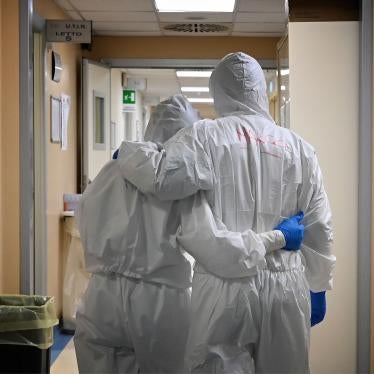CONTEXT
Individuals with disabilities are often assumed to be at lower risk, and thus face lower of HIV infection rates, than their non-disabled peers. They are believed to be asexual, less likely to use drugs or alcohol, and at a lower risk of violence or sexual assault than the general population.
But a growing body of research shows that these assumptions are wrong-the HIV infection rate among people with disabilities is up to three times as high as people without disabilities.
According to the United Nations, at least one in every ten people-660 million individuals-live with a disability significant enough to make a difference in their daily lives.
HUMAN RIGHTS, DISABILITY, AND HIV/AIDS
People with disabilities face a wide range of human rights abuses that increase their risk of HIV. These include:
Higher risk of violence and lack of legal protection
Individuals with disabilities are up to three times more likely to be victims of physical abuse, sexual abuse, and rape. In many countries, individuals with disabilities have little or no access to police, legal counsel, and courts for protection. Individuals with disabilities who are victims of rape or sexual assault often have less access to medical interventions, including psychosocial counseling and prophylactic care, than their non-disabled peers.
Lack of Education
Children with disabilities are often shut out of education, including on sexual health. They are often considered a distraction in schools, or incapable of learning. In many parts of the world, children are barred from school because schools are physically inaccessible. The World Bank estimates that as many as 97 percent of all individuals with disabilities - and 99 percent of women with disabilities are illiterate.
Lack of sexual health information
It is commonly assumed that individuals with disabilities are not sexually active. But research shows that they are as likely to be as sexually active as their non-disabled peers. Homosexuality and bisexuality occur at the same rate among people with disabilities as among the general population. However, they are less likely to receive information about HIV prevention and safe sex, and are less likely to have access to prevention methods such as condoms.
PROTECTION UNDER INTERNATIONAL LAW
Convention on the Rights of Persons with Disabilities (CRPD)
- Persons with disabilities enjoy all human rights and fundamental freedoms on an equal basis with others (Article 5).
- Persons with disabilities have the right to be actively involved in planning and carrying out HIV policies and programs, especially those directly impacting them (Article 4).
- Governments must protect a broad range of rights including the right to education, information and communication, as well as the right to individual autonomy and independence (Articles 3, 16, 19, 21, 22, 24).
- Governments must provide persons with disabilities with the same quality and standard of health care and programs as provided to other people, including in the area of sexual and reproductive health and population-based programs (Article 25).
- Governments must also enable persons with disabilities to attain and maintain their maximum independence, full physical, mental, social and vocational ability, and full inclusion and participation in all aspects of life (Article 26).
International Covenant on Economic, Social and Cultural Rights (ICESCR)
- All persons, including persons with disabilities, have the rights to work, to social security, to family life, to an adequate standard of living, and to education (Articles 6, 7, 9, 10, 11, 13).
- Governments must protect the right of everyone to the enjoyment of the highest attainable standard of physical and mental health (Article 12).
- Governments must guarantee that the rights in the ICESCR will be exercised without discrimination of any kind as to birth or other status, such as disability (Article 2).
International Covenant on Civil and Political Rights (ICCPR)
- All persons are equal before the law and are entitled without any discrimination to the equal protection of the law. The law shall prohibit any discrimination and guarantee to all persons equal and effective protection against discrimination on any ground (Article 26).
- Governments must protect the rights to life, physical integrity, to individual liberty and security, to privacy and to procedural fairness in law (Articles 6, 7, 9, 10, 14, 16, 17).
- Governments must guarantee that the rights in the ICCPR will be exercised without discrimination of any kind as to birth or other status, such as disability (Article 2).
Convention on the Rights of the Child (CRC)
- Governments have an obligation to protect the human rights of all children, including children with disabilities. The rights set out in the CRC must be applied without discrimination based on disability (Article 2).
- Assistance to the child and those responsible for his or her care "shall be designed to ensure that the disabled child has effective access to and receives education, training, health care services, rehabilitation services, preparation for employment and recreation opportunities in a manner conducive to the child's achieving the fullest possible social integration and individual development" (Article 23).
WHAT YOU CAN DO
- Reach out to persons with disabilities and disabled peoples organizations to learn more about the specific needs of persons with disabilities in your community.
- Ensure HIV services, including testing centers, care services, and teaching and training sessions are fully accessible to persons with different types of disabilities. This includes providing sign language interpretation, easy-to-understand information materials, Braille resources and ensuring that the services are physically accessible.
- Provide information in formats tailored to people with different disabilities.
- Train staff of HIV organizations on disability issues and the disability community on HIV issues. Train persons with disabilities and especially HIV-positive persons with disabilities as peer support workers in HIV programs.
- Promote and fund research on HIV and disability, ensuring that persons with disabilities are included in the team designing, implementing and analyzing the research.
- Encourage governments to ratify and incorporate into national law instruments that protect the human rights of persons with disabilities, including the CRPD.
- Advocate for persons with disabilities to have full sexual and reproductive rights, access to harm reduction services, and to be free from physical and sexual abuse.
FOR MORE INFORMATION:
AIDS-Free World: Disability & HIV/AIDS, www.aids-freeworld.org/content/blogcategory/35/66/
AIDSLEX, http://www.aidslex.org/english/Topics/Topic-Details/?rid=26
Health Canada, http://data.unaids.org/pub/Report/2009/20091111_hiv_and_disability_en.pdf
Human Rights Watch: Disability Rights, https://www.hrw.org/en/disability-rights
Human Rights Watch, "As if We Weren't Human: Discrimination and Violence against Women with Disabilities in Northern Uganda," https://www.hrw.org/en/reports/2010/08/24/if-we-weren-t-human
World Bank, http://siteresources.worldbank.org/DISABILITY/Resources/Health-and-Welln...
Yale University and World Bank Survey on HIV/AIDS and Disability, http://cira.med.yale.edu/globalsurvey/







